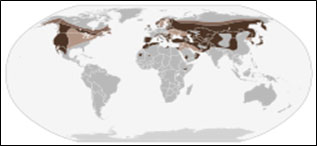NEW Centre Opening 18th October 2025 - Tickets available now

Golden Eagle
"Midas"
Midas joined us in January 2017 having hatched in May 2016. Midas is a firm favourite with visitors as he can be seen showing off his impressive 'stoop' during the flying displays. He is also becoming more confident about defending himself when he gets mobbed by the wild crows and buzzards in the spring as they defend their nests. Despite his comparative size he never hurts them, just warns them to leave him alone.
Click below to Sponsor "Midas"
Golden Eagle Facts
Aquila chrysaetos
Territory / Location
There are golden eagle territories in and around most of Scotland’s upland forests. Keep your eyes on the sky in Argyll, Galloway, and Glenmore Forest Parks, on Mull and Skye, and in Glen Affric. The golden eagle's world range spreads through the Palaearctic region including mountainous parts of Europe as far south as northern Africa and south-east Asia. It also occurs in North America
Habitat
Golden eagles are fairly adaptable in habitat but often reside in areas with a few shared ecological characteristics. They are best suited to hunting in open or semi-open areas and search them out year-around. Native vegetation seems to be attractive to them and they typically avoid developed areas of any type from urban to agricultural as well as heavily forested regions.
Conservation Status
Least Concern

Diet
Golden eagles use their agility and speed combined with powerful feet and massive, sharp talons to snatch up a variety of prey mainly hares, rabbits, marmots and other ground squirrels.
Size / Weight
66 - 102cm in length and 180 – 234cm wingspan males may average around 360 g and females around 510g
Nesting
Most breeding activities take place in the spring; they are monogamous and may remain together for several years or possibly for life laying 1-4 eggs.
Life Expectancy
10-17 years old average in the wild
32 years oldest recorded in the wild
46 years oldest recorded in captivity
Scientific
Classification
KINGDOM
Animalia
PHYLUM
Chordata
CLASS
Aves
ORDER
Accipitriformes
FAMILY
Accipitridae
GENUS
Buteoninae
SPECIES
A. chrysaetos
Did you know?
The final adult plumage is not fully attained until the birds are between 5 and a half and 6 and a half years old.
A typical, unhurried soaring speed in golden eagles is 28–32 mph, When hunting or displaying its capable of very fast gliding, attaining speeds of up to 120 mph, When diving (or stooping) in the direction of prey or during territorial displays, the eagle holds its wings tight and partially closed against its body and the legs up against its tail. In a full stoop, a golden eagle can reach speeds of up to 150-200 mph when diving after prey.









